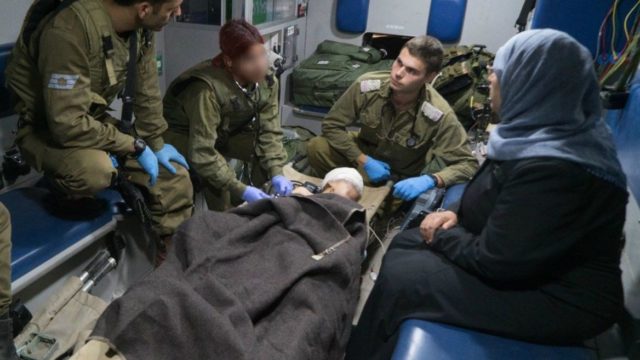On August 3, The Times of Israel reported that Israel has frozen its aid to Syrian citizens, dubbed “Operation Good Neighbor,” and has begun to dismantle its field clinic used to treat those wounded in the Syrian Civil War. These developments come in the wake of Syrian president Bashar Assad consolidating his power on the Syrian side of the Golan Heights, following the end of the Southern Syrian Offensive on July 31 and the recapture of Daara and Quneitra Provinces.
Operation Good Neighbor began in March 2013, when the Israeli Defense Forces (IDF) chose to allow seven Syrians to cross the border into Israel for medical treatment. It has since grown exponentially in scope, encompassing the utmost compassion and bravery from Israeli military, non-governmental organizations (NGOs), and civil society. Operation Good Neighbor’s achievements demonstrate that Israel is not the problem in the Middle East and give a glimmer of hope for future Israeli-Syrian relations.
Since 2016 alone, Operation Good Neighbor has shuttled approximately 1,500 tons of food, 50 tons of baby food, 250 tons of clothing, 25,000 boxes of medicine and medical equipment, 250,000 gallons of fuel, 7,900 packages of diapers, and 14,000 hygienic products to Syrians. Donated by NGOs and sometimes even by the Israeli government itself, relief has included baby formula; 3-D printers to make prosthetic limbs; and even generators, cars, and mules.
Humanitarian Aid from the IDF
Important milestones of the IDF’s humanitarian assistance to the Syrian people include the following:
- In June 2015, Israel privately threatened Syrian rebels led by the jihadist al-Nusra Front when they tried to sneak into the Syrian Druze village of Hader to avenge a Druze attack on an Israeli military ambulance transporting two injured Syrian civilians. (The Druze were trying to lynch the Syrians in the ambulance.)
- In August 2017, the IDF opened a field clinic named Mazor Ladach (“Bandaging Those in Need”) on the Israeli side of the Golan Heights with the support of international aid organizations such as the U.S. Christian charity Friend Ships Unlimited. To date, the clinic has treated about 6,000 Syrians. As mentioned above, recent reports indicate that the IDF is beginning to dismantle the clinic.
- In November 2017, Israel once again pledged, this time publicly, to defend the Syrian Druze village of Hader from attacks from the al-Nusra Front. This pledge followed a car bomb attack in the village by the al-Nusra Front that killed at least nine people.
- In December 2017, Israel opened a maternity clinic in Syria. As of December 2017, the clinic had seen 200 patients and 30 births.
- In June 2018, in an overnight operation, the IDF delivered 28 tons of food (including 15 tons of baby food), 30 tons of clothing, three pallets of medical supplies, and 300 tents to Syrians fleeing Daara.
- In July 2018, the IDF successfully evacuated 800 Syrian aid workers known as the White Helmets, and their families, from southwest Syria following an “immediate threat to their lives.”
Humanitarian Aid from NGOs and Citizens
The IDF’s aid efforts have been augmented by Israeli NGOs and citizens:
- Doreen Gold, who does not disclose her real name to protect her identity, heads IL4Syrians, a group of 200 Israeli volunteers also operating inside Syria since 2011. Gold’s group works directly with Syrian NGOs and supports 17 Syrian field hospitals and surgery rooms. On one mission, IL4Syrians donated 3,000 chemical suits to protect Syrian doctors working with patients who were victims of chemical attacks. All volunteers sign a waiver stating that if they are captured in Syria, Israel will not negotiate for their release.
- Several hospitals in northern Israel treat Syrian citizens, including Ziv Medical Center (in Safed), Western Galilee Medical Center (in Nahariya), Rambam Medical Center (in Haifa), and Poriah Hospital (near Tiberias). Israeli hospitals have treated over 3,500 Syrians since 2013, in addition to over 1,300 Syrian children since 2016.
- In a crowdfunding campaign from October 2016 through April 2017, the Israeli grassroots group Just Beyond Our Border raised approximately $550,000 from Israeli and Jewish donors for aid to Syrian civilians. This aid is transported to Syria via Israeli Flying Aid.
- The Golan Regional Council, comprising 32 Israeli towns in the Golan Heights, makes repeated appeals to its citizens to donate food, clothes, blankets, and toys. The Council has also asked each Israeli child living in the Golan to prepare a care package for a child in Syria.
- Israeli entrepreneur and philanthropist Morris Kahn is buying hearing aids for an expected 100 Syrian children, at the cost of NIS 5,000 ($1,380 USD) per ear.
Conclusion
While the future of Operation Good Neighbor remains uncertain, hopefully, its legacy will endure. Israel will continue to serve as a beacon of hope for those who do not live free. Israel will continue to provide humanitarian aid for those in need and even stands ready to assist citizens of its enemies. More importantly, through its good deeds, Israel has forever changed the hearts and minds of thousands of Syrians. Hopefully, those assisted by Israel will tell their stories to their families and friends. A collective memory may take root that would serve as both an antidote to any continued efforts by Assad to brainwash his people with anti-Israel sentiments and a fountainhead for future Israeli-Syrian peace.
Steve Postal is a member of the Jewish Policy Center and works in health care policy in the Washington, DC area.


